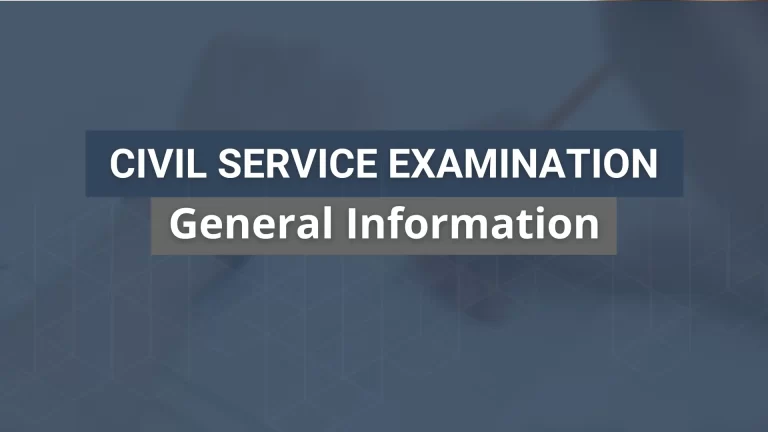This is the Multiples Choice Questions Part 1 of General Information. In preparation for the Civil Service Exam, practice, and familiarize every question we have, it might be included in the actual examination. Good luck.
Be fully prepared for your exam, follow our tips on effective studying and test-taking strategies. Click here to read the tips:
| 3 Effective Prayers Before, During and After the Board Examination |
| Top 5 risky behaviors to avoid during board exam reviews. |
| Top 5 big mistakes when learning during board exam reviews. |
| More… |
General Information Part 1
1. What are the 3 main branches of the Government of the Philippines?
a. Senate, Supreme Court, Congress
b. Presidential, Unicameral- Parliamentary, Bicameral-Parliamentary
c. Legislative, Executive, Judicial
d. The Legislature, The Senate, The Supreme Court
Answer: c
2. The Supreme Court shall be composed of a Chief Justice and how many Associates Justices?
a. 12
b. 13
c. 14
d. 15
Answer: c
3. The Commander-in-Chief of all armed forces of the Philippines this 2017 is _____.
a. Air Force Commanding General Jeffrey Delgado
b. Rodrigo Duterte
c. Chief Justice Maria Lourdes Sereno
d. AFP Chief Lieutenant Gen. Emmanuel Bautista
Answer: b
4. The executive power shall be vested in the _____.
a. President of the Philippines
b. House of Representatives
c. The Supreme Court
d. The Congress
Answer: a
5. The legislative power shall be vested in the_____ which shall consist of a Senate and a House of Representatives.
a. Congress of the Philippines
b. House of Ombudsman
c. The Supreme Court
d. Bureau of Internal Revenue
Answer: a
6. The Senate shall be composed of how many senators elected at large by voters of the Philippines?
a. 21
b. 22
c. 23
d. 24
Answer: d
7. How long shall the term of office of the senators be commenced?
a. 3 years
b. 4 years
c. 5 years
d. 6 years
Answer: d
8. The term of office of the President and Vice-president of the Philippines shall be up to how many years?
a. 3 years
b. 4 years
c. 5 years
d. 6 years
Answer: d
9. The members of the House of Representatives shall be elected for a term of _____.
a. 3 years
b. 4 years
c. 5 years
d. 6 years
Answer: a
10. The following shall be exempted from taxation except:
a. Lands and buildings
b. Churches and convents
c. Charitable institutions
d. Non-profit cemeteries
Answer: a
11. The Congress, by a vote of _____ of both Houses in joint session assembled, voting separately, shall have the sole power to declare a state of war.
a. Two-thirds
b. One-half
c. Three quarters
d. Minority
Answer: a
12. It states that “no person shall be deprived of life, liberty, or property without due process of law, nor any person be denied the equal protection of the laws.”
a. Article VI
b. Bill of Rights
c. Republic Act
d. Court Order
Answer: b
13. All of the following is TRUE except:
a. No person shall be compelled to be a witness against himself
b. No person shall be imprisoned for non-payment of debt or poll tax.
c. No ex post facto law or bill of attainder shall not be enacted.
d. No person shall be detained solely by reason of his political beliefs and aspirations.
Answer: c
14. The following are citizens of the Philippines except:
a. Those fathers or mothers are citizens of the Philippines
b. Those who are born before January 17, 1973, of Filipino mothers, who elect Philippine citizenship upon reaching the age of majority
c. Those who are naturalized citizens of the Philippines in accordance with law.
d. All of the above are true.
Answer: d
15. It is the right and obligation by all citizens, who are at least 18 years of age, and qualified by law, to vote in the election of national and local officials of the government without literacy,, property, or other substantive requirement.
a. Suffrage
b. Election
c. Voting power
d. Civil Right
Answer: a
16. The three inherent powers of the state are the following except one:
a. Police Power
b. Power of Eminent Domain
c. Power of Taxation
d. Power to Impeach
Answer: d
17. It is the power of the State to promote public welfare by restraining the use of both liberty and property of all people.
a. Police Power
b. Power of Eminent Domain
c. Power if Taxation
d. Power to Impeach
Answer: a
18. It is the power of the State to take properties for the purpose of public use upon payment of just compensation.
a. Police Power
b. Power of Eminent Domain
c. Power if Taxation
d. Power to Impeach
Answer: b
19. It is the power of the State to impose charge or burden to persons and properties, and property rights for the purpose of raising revenues to protect the people and extend public projects and services.
a. Police Power
b. Power of Eminent Domain
c. Power if Taxation
d. Power to Impeach
Answer: c
20. The following are members of the Constitutional Commission except:
a. Commission on Civil Rights
b. Commission on Elections
c. Civil Service Commission
d. Commission on Audit
Answer: a


